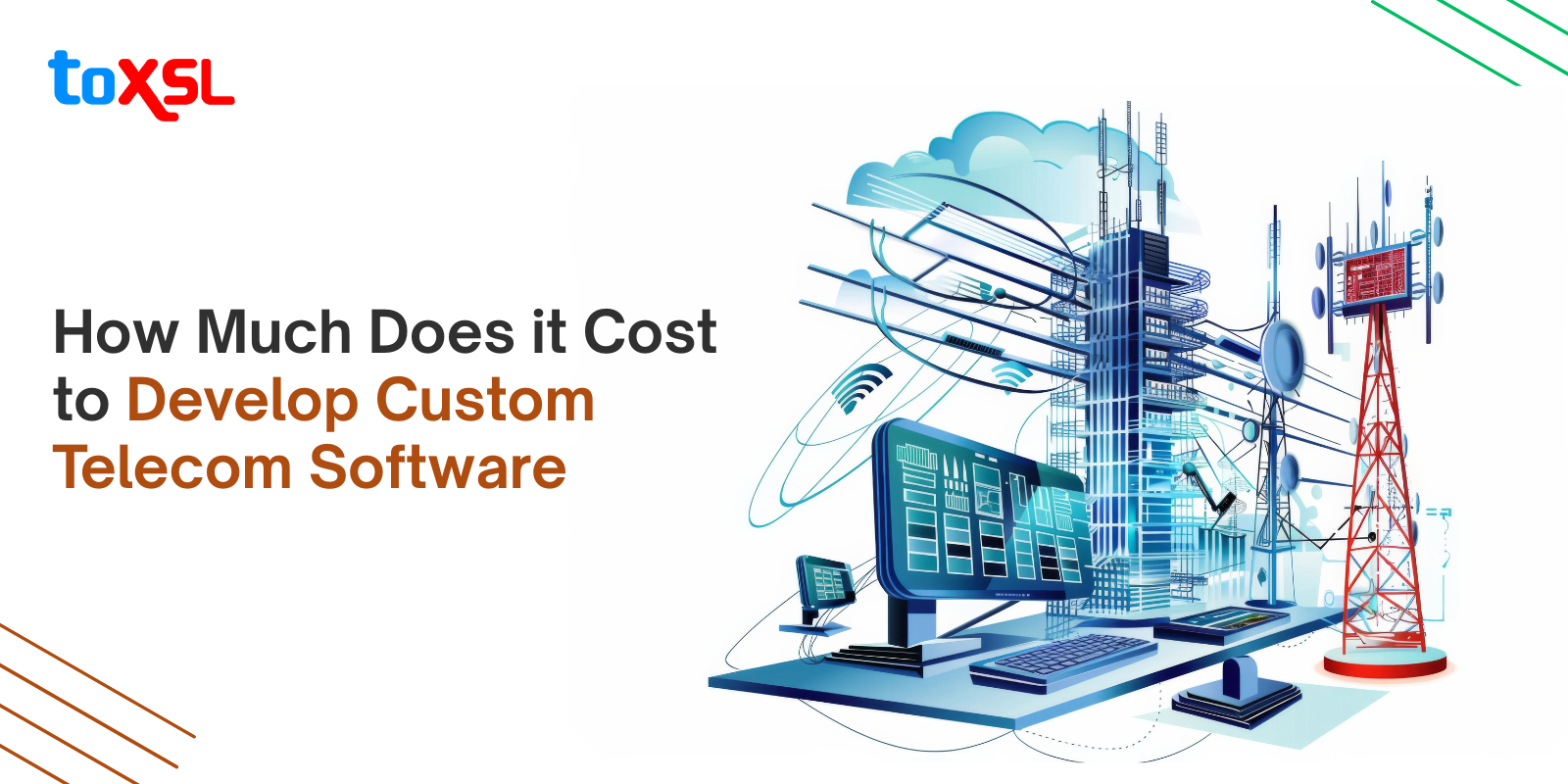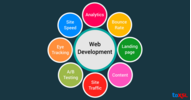- Aug 21, 2025
Share this post on:

The telecommunication industry has made the exchange of information easy in the 21st century. The global telecom software market is projected to reach USD 1.9 billion by 2030, growing at a CAGR of 6.5%. In addition to major providers, such as cable, satellite, wireless, and internet companies that send and receive data, including videos, sounds, phone calls, and text, the telecommunication sector also supports related industries. Sectors such as e-commerce, blockchain, and virtual call centers rely on telecom software for essential connectivity.
Key Takeaway:
- Tailor-made telecom software addresses unique operational challenges, offering scalability, flexibility, and deeper integration compared to off-the-shelf solutions.
- When planning a custom solution, it is essential to consider that features such as AI, real-time analytics, and multiple integration requirements can significantly impact the development budget.
- Innovations such as 5G, edge computing, and blockchain are transforming the capabilities of telecom software.
- Telecom software must follow security standards and regulations to protect sensitive user and network data.
Cost to Develop Custom Telecom Software
Custom telecom software development costs can vary widely depending on project size, complexity, features, technologies used, and development location. For 2025, typical development costs range from around $20,000 for basic projects to over $250,000 or more for complex, enterprise-level telecom software.
Project Size | Estimated Cost Range | Typical Development Duration | Description |
|---|---|---|---|
Small/Basic | $5,000 – $10,000 | 3 – 4 months | Simple telecom apps or tools with basic features, minimal integrations |
Medium/Moderate | $10,000 – $50,000 | 4 – 8 months | Telecom software with moderate complexity such as multiple user roles, integrations (billing, CRM), better UI/UX |
Large/Complex | $50,000 – $250,000+ | 8 – 12+ months | Enterprise telecom solutions with advanced features (AI, machine learning, real-time data), multi-system integrations, high scalability and security |
Factors Affecting Custom Telecom Software Development Cost
Project Complexity: The complexity of the telecom software is one of the biggest cost drivers. Complex projects with advanced features like real-time monitoring, AI, machine learning, multiple user roles, and extensive third-party integrations require more development time and expertise, thus increasing costs.
Technology Stack: The choice of technologies impacts both the initial development and long-term maintenance costs. Using modern, scalable technologies (cloud platforms, microservices architecture) may cost more initially but offer better performance and easier future upgrades. Specialized technologies such as AI, IoT, or blockchain integrations can further increase costs.
Development Team Location: Hourly rates differ significantly based on geographical location. For example, developers in North America or Western Europe generally cost more than those in Eastern Europe or Asia. The size, experience, and skill set of the team also influence overall cost. Projects with highly experienced developers or large teams are more expensive but often deliver higher-quality solutions faster.
UI/UX Design: Custom telecom software often requires intuitive and user-friendly interfaces. Extensive graphic design, multi-platform support (mobile, web, desktop), and user experience research add to the cost.
Testing and Quality Assurance: Comprehensive QA is critical for telecom software to ensure reliability and security. Testing across different devices, performance under heavy loads, security audits, and fixing bugs demand dedicated resources, increasing the budget.
Compliance and Security Requirements: Telecom applications handle sensitive data and must comply with regulations such as GDPR or HIPAA, which adds complexity. Implementing strong security measures, encryption, and conducting audits or penetration testing are necessary but incur additional costs.
Ongoing Maintenance and Support: Post-launch maintenance is essential for fixing bugs, updating software, and adding new features. It typically costs around 15-25% of the original development cost annually and should be factored into the total budget.
Hidden and Additional Costs: Pre-development activities like business analysis, requirement gathering, and project planning take time and resources. Deployment, server costs, user training, and documentation also add to the overall expense but are sometimes overlooked.
Trends in the Telecom Industry
The telecom industry is undergoing a profound transformation driven by rapid technological advancements and evolving customer demands. As we delve into 2025, several key trends are shaping the future of telecommunications, making communication faster, smarter, and more efficient.
Standalone 5G and the Road to 6G: 5G technology has moved beyond initial rollouts to become a mainstream catalyst for innovation across industries. In 2025, standalone 5G networks are set to deliver on promises of higher speeds, ultra-low latency, and enhanced reliability. The evolution toward 6G is also on the horizon, aiming to utilize new spectrum bands like the terahertz range for even faster data transmission and minimal latency, opening doors for groundbreaking applications.
Cloud Computing Powering Telecom Operations: Cloud computing continues to steer the telecom sector into a new era by replacing bulky physical infrastructure with virtualized, scalable networks. Telecom providers benefit from flexibility, cost efficiency (shifting expenditures from capital to operational expenses), and the ability to scale resources dynamically according to demand. Hybrid and multi-cloud environments tailored to telecom needs are expected to rise, further accelerating digital transformation.
Artificial Intelligence and Automation: AI and automation have become integral to telecom operations. AI algorithms are optimizing network performance by predicting outages, managing traffic flow, and enabling self-healing networks. For customer service, AI-powered chatbots and virtual assistants are providing 24/7 support and personalized experiences. Additionally, AI technologies are enhancing network security and aiding product innovation, with leading operators leveraging AI for competitive advantage.
Cybersecurity as a Priority: With the increasing sensitivity and volume of telecom data, cybersecurity remains a critical focus. Telecom companies are adopting comprehensive, resilient approaches such as cybersecurity mesh architectures to protect distributed environments. Enhanced security protocols are essential to safeguard user data and maintain trust amidst growing cyber threats.
Edge Computing and Fixed Wireless Access: Edge computing complements 5G by processing data closer to the user, reducing latency, and enabling new real-time applications. Fixed Wireless Access (FWA), utilizing 5G, is expanding as a cost-effective broadband alternative, particularly for rural and underserved regions. FWA is expected to connect millions of homes globally, bridging connectivity gaps.
Expansion of B2B Services: Telecom operators are increasingly offering bundled service packages combining mobile, fixed connectivity, streaming, cloud, and digital services. This customer-centric approach simplifies user experience and drives revenue growth. On the business side, telecoms are evolving into digital solution providers for sectors like healthcare, education, and industrial IoT, leveraging their networks to support telemedicine, e-learning, smart homes, and automation.
Modernization of Digital Infrastructure: The modernization of Business Support Systems (BSS) and Operational Support Systems (OSS) is prioritized to create integrated, responsive telecom infrastructures. These efforts enhance operational efficiency and customer experience, underpinning the delivery of next-generation services.
Reasons to Hire Telecom Software Developers from ToXSL Technologies
In the rapidly evolving telecom industry, having the right software development partner can be the key to success. ToXSL Technologies, a leading software development company, stands out as a top choice for telecom companies looking to innovate and scale. Here are compelling reasons why hiring telecom software developers from ToXSL Technologies makes perfect sense:
Proven Expertise and Experience: ToXSL has a team of highly skilled team of professionals with deep expertise in Android, iOS, web frameworks, AI, IoT, and blockchain. With over 2000+ satisfied clients globally and a strong track record of delivering complex strategic IT projects, we offer unmatched telecom software development experience.
End-to-End Development Services: From initial consultation and requirement analysis to development, rigorous testing, deployment, and ongoing maintenance, we offer full-cycle telecom development services. This ensures a seamless, high-quality product that meets all industry standards and your specific business needs.
Customized and Scalable Solutions: The telecom industry demands tailor-made software to address unique operational challenges. We specialize in developing custom, scalable telecom software solutions that grow with your business, whether it’s operational support systems, customer engagement apps, or AI-powered analytics tools.
Focus on Security: We integrate advanced cybersecurity practices, including managed security services, risk assessments, and compliance with regulations such as ISO standards, ensuring your telecom infrastructure stays secure and resilient.
Competitive Pricing: With our efficient team structure and optimized development processes, ToXSL offers competitive pricing models. You get high-quality, cutting-edge telecom software solutions that are delivered on time and within budget, maximizing ROI.
Customer Support: The journey doesn’t end at deployment. ToXSL provides ongoing technical support, updates, and maintenance to ensure your telecom software evolves with industry trends and business growth, reducing downtime and enhancing user satisfaction.
Conclusion
Developing custom telecom software is a significant investment pivotal to your company’s success in today’s competitive market. So, if you are looking to develop telecom software, look no further than ToXSL Technologies. We are a leading telecom software company with over 12 years of experience delivering bespoke software solutions. We bring deep telecom software domain expertise combined with advanced technical skills in AI, IoT, blockchain, and cloud computing. Our customer-centric and agile approach ensures scalable, secure, and high-performance telecom software fits your budget and timeline without compromise. Request a quote.











